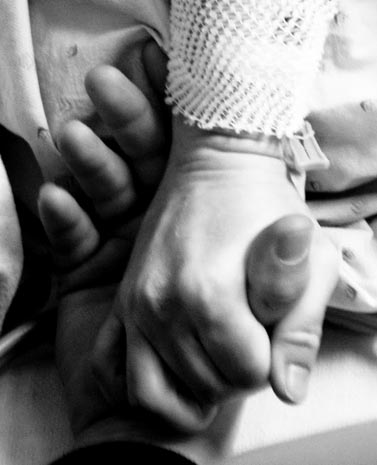
This is a response to Eric Klien’s article addressing this problem. The following piece offers a solution.
When our lives seem like a daily struggle and things just don’t seem to be flowing easily, there’s a good chance it’s because we’re still carrying some unhealed emotional baggage from childhood.
And tragically, the source of most people’s earliest and deepest wounds in life is the very place that was supposed to protect us—our family of origin.
Way back when I first started my own journey of sorting out the emotional, mental and spiritual baggage that had been passed on to me from my family, I realised that many of my experiences had a profoundly negative impact on the way I viewed myself, the world around me and where I fitted in. So I figured that the most powerful way to approach the healing process would be to engage with my family—especially my parents.
Back in my mid 20s, I had been seeing a counsellor for about a year regarding a relationship problem when I finally summoned up the courage to talk to my controlling mother about how frightening I had found the many heated arguments between her and my relatively passive father when I was a child.
I chose my mother first because I could see that healing the deep-seated fears that I had about conflict, intimacy and being my true self around her would profoundly transform my life.
So, I called up my mother and invited her out to lunch to talk. Being highly perceptive to the point of paranoia, she immediately sensed that something was up and made every excuse under the sun to avoid engaging with me.
“It’s too close to Christmas!,” she said. Actually, Christmas was still four weeks away.
“I have to re-pot the Azaleas!” Somehow, I figured the garden could wait a couple of hours without dying.
“I don’t want to!” This was important to me, and I wasn’t going to take no for an answer this time.
And so I dragged my mother kicking and screaming into a conversation she didn’t want to have, so that I could tell her about my traumatic experience growing up in the family she created.
It didn’t go well.
My mother went straight into defensive denial mode and minimised my feelings by telling me that, “All families have difficulties, ours was no different to anyone else’s.”
“It wasn’t that bad.”
“We gave you everything,” etc.
The pain I felt about having my feelings ignored and invalidated as a child just ended up being reinforced as an adult with the same message: my feelings don’t matter. Which is just a short inner-child-logic step away from: I don’t matter.
After an incredibly tense conversation my mother got onto the phone to my second oldest sister and told her that I’d said terribly hurtful things to her. I thought I’d worked really hard to use “I” statements, avoid blame and just talk about my experience.
Well there’s only so much we can do when someone just doesn’t want to acknowledge our pain. My sister responded by ringing me to dump a truckload of anger onto me, right when I felt at my most vulnerable.
The fallout in our relationship lasted for years.
Eventually I learned my lesson: Engaging our family too early in the healing process is likely to trigger all their unhealed emotional wounds and unless they’re particularly insightful, the pain they feel is likely to end up expressed as rage or resentment, directed straight at us. Everyone can end up being triggered in a way that isn’t healing for anyone.
If the emotional wounds in our families of origin don’t run particularly deep, talking to other family members to say what needs to be said about the past can be a good strategy for creating a more healing future. But if the pain cuts deep to everyone’s core, it may be better to do our own deep healing work with other people first.
The core wound in my wider family of origin is emotional abandonment, leading to a deeply painful inner sense of unworthiness. It manifests in different family members in different ways: narcissism, emotional unavailability, passivity, fear of expressing emotions, self-directed anger, low self-esteem, anorexia, perfectionism, stress-related chronic illness, religiosity, insecurity, escapism, obsessive compulsions, depression, anxiety and acting out of obligation and/or fear rather than love.
Our emotional experiences cuts deeply to our sense of who we are. Emotionally unavailable parents tend to raise emotionally unstable children. It’s difficult for us as children to form a secure attachment to parents who acts like an emotional brick wall. As children, we learn our emotional coping skills from observing our parents.
When we’re a child with powerful feelings inside but stoic parents who don’t show their own feelings to us in a healthy way, we inevitably conclude that there is something deeply wrong and different about us. Plus, the natural expression of our emotions may have triggered our parents’ unhealed emotional pain, causing them to shut us down with various forms of punishment in order to end their discomfort.
Over time, we learn to suppress our emotions, and along with them, our true selves.
Fast forward to today, 20 years after the painful conversation with my mother, and things are different. During that time I’ve had a great deal of therapy and done a lot of emotional healing work. I’ve let go of a lot of anger and developed greater emotional resilience.
I’ve expressed the emotions that I kept buried for so long about situations in the past that hurt me, and in doing so released the emotional charge on them so I’m not so triggered any more. I’m still on my healing journey, but I’m making progress.
As a result, I’m more open to having challenging and healing conversations without having to blame other people for my pain, make them wrong, or get on my defensive high horse.
So the key to healing our family karma is to heal our own inherited emotional baggage first.
Let other family members deal with their baggage when they’re ready. This leaves us in a much more peaceful state to deal with issues that trigger other members of our family. We can then lead the way towards healing for everyone else, knowing that it will take time for other people just as it did for us. Some relatives may never get on board, and we need to be okay with that too.
People only change after they feel accepted exactly the way they are.
So throw in plenty of love, patience, acceptance and letting go of expectations along the way. Once we become unattached to the need to heal our family karma, other family members will find it much easier to get on board and join us in the healing process.
That’s how to really heal your family karma.
Love elephant and want to go steady?
Sign up for our (curated) daily and weekly newsletters!
Apprentice Editor: Sue Adair/ Editor: Travis May
Photo Credit: Brittany Humphrey via pixoto

 Share on bsky
Share on bsky






Read 1 comment and reply